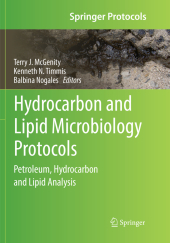 Neuerscheinungen 2018Stand: 2020-02-01 |
Schnellsuche
ISBN/Stichwort/Autor
|
Herderstraße 10
10625 Berlin
Tel.: 030 315 714 16
Fax 030 315 714 14
info@buchspektrum.de |

Terry J. McGenity, Balbina Nogales, Kenneth N. Timmis
(Beteiligte)
Hydrocarbon and Lipid Microbiology Protocols
Petroleum, Hydrocarbon and Lipid Analysis
Herausgegeben von McGenity, Terry J.; Timmis, Kenneth N.; Nogales, Balbina
Softcover reprint of the original 1st ed. 2017. 2018. x, 317 S. 254 mm
Verlag/Jahr: SPRINGER, BERLIN; SPRINGER BERLIN HEIDELBERG 2018
ISBN: 3-662-57083-1 (3662570831)
Neue ISBN: 978-3-662-57083-8 (9783662570838)
Preis und Lieferzeit: Bitte klicken
This Volume presents methods for analysing and quantifying petroleum, hydrocarbons and lipids, based on their chemical and physical properties as well as their biological effects. It features protocols for extracting hydrocarbons from solid matrices, water and air, and a dedicated chapter focusing on volatile organic compounds. Several approaches for separating and detecting diverse classes of hydrocarbons and lipids are described, including: (tandem) gas chromatography (GC) coupled with mass spectrometry (MS) or flame-ionisation detection, Fourier-transform induction-coupled-resonance MS, and fluorescence-based techniques. The book details high-performance liquid chromatography MS for microbial lipids, as well as a combination of techniques for naphthenic acids. Two chapters focus on quantifying bioavailable hydrocarbon fractions by using cyclodextrin sorbents and bacterial bioreporters, respectively, while a closing chapter explains how compound-specific stable-isotope analysis can be used to measure the fate of hydrocarbons in the environment.
Hydrocarbon and Lipid Microbiology Protocols
There are tens of thousands of structurally different hydrocarbons, hydrocarbon derivatives and lipids, and a wide array of these molecules are required for cells to function. The global hydrocarbon cycle, which is largely driven by microorganisms, has a major impact on our environment and climate. Microbes are responsible for cleaning up the environmental pollution caused by the exploitation of hydrocarbon reservoirs and will also be pivotal in reducing our reliance on fossil fuels by providing biofuels, plastics and industrial chemicals. Gaining an understanding of the relevant functions of the wide range of microbes that produce, consume and modify hydrocarbons and related compounds will be key to responding to these challenges. This comprehensive collection of current and emerging protocols will facilitate acquisition of this understanding and exploitation of useful activities of such microbes.
Introduction to petroleum, hydrocarbon and lipid analysis.- Hydrocarbon extraction.- Determination of petroleum hydrocarbon compounds from soils and sediments using ultrasonic extraction.- Protocols for the chemical analysis of hydrocarbons in petroleum oils and the assessment of environmental contamination.- Analysis of lipids and polycyclic aromatic hydrocarbons as indicators of past and present (micro)biological activity - Protocols for GC-based methods for hydrocarbon analysis.- Comprehensive two dimensional gas chromatography to assess petroleum product weathering.- Measuring hydrocarbons in the atmosphere.- Protocols for the Quantification of Dimethyl Sulfide (DMS) and Other Volatile Organic Compounds in Aquatic Environments.- Fluorescence EEMs and PARAFAC techniques in the analysis of petroleum components in the water column.- Protocols for Measurement of Naphthenic Acids in Aqueous Samples.- Compositional Characterization of Acidic Petroleum Constituents Using Negative Ion Mode Electrospray Ionization Coupled with Fourier Transform-Ion Cyclotron Resonance Mass Spectrometry.- Measurement of hydrocarbon bioavailability in soil.- Measurements of hydrocarbon pollutants in aqueous samples using bioreporter assays.- Protocol to investigate volatile aromatic hydrocarbon degradation with purge and trap coupled to a gas-chromatograph / isotope ratio mass spectrometer.- Comprehensive analysis of microbial lipids in environmental samples through HPLC-MS protocols.


